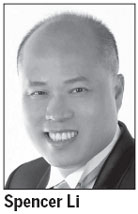US to keep playing trade war with China
Updated: 2012-11-24 15:38
By Spencer Li (HK Edition) (China Daily)
|
||||||||
On the night of the US election, President Barack Obama told the nation "we've got more work to do". Job creation is one of the most challenging tasks for Obama, though the current 7.9 percent unemployment rate is the lowest during his first term. If Obama wants to run his new term smoothly and successfully, he needs to create new job opportunities, increase US products' competitiveness and cool the growing anger among many who feel disenfranchised.

During his first term, Obama's most controversial move was to bail out the non-competitive automobile companies General Motors and Chrysler in 2009. One in eight jobs in Ohio are tied to automotive industry. Obama has promised voters to rebuild US manufacturing industries and create more jobs and is trying to bring overseas business operations back to the US.
One of the controversial battlefields with China will be intellectual property rights issues and the US will seize every opportunity to claim damages due to suspected IPR violations in China. China and US recently mounted a successful joint operation to combat the smuggling of simulated luxury bags, worth five billion yuan, made in a Guangzhou factory that had operated since 2001.
Ironically, a report released by the House Intelligence Committee of the US Congress last month claimed two Chinese telecommunications manufacturers, Huawei and ZTE, posed a threat to national security and urged US companies to avoid working with them. This report gave rise to fears that Huawei and ZTE were snooping into companies and individuals. Huawei is the second largest telecommunications equipment maker in the world, with $32 billion in revenue last year. There are 140,000 employees working in research and development at Huawei while Cisco employs only 65,000 workers.
Of course, there is no solid evidence to prove the allegation and Bill Plummer, vice-president of external affairs of Huawei, told the media that "Huawei is a world-trusted company with products globally proven to be secure. Those are the facts today and those will be the facts tomorrow...".
It has become a often-used practice for the US government to impose anti-dumping penalty taxes or unfair import taxes on Chinese companies affecting the American workforce. US companies are pushing the Congress to protect their interests amid their diminishing market share.
After the change of leaders in both countries, a generally stable political relationship will be maintained between US and China. The Obama government is offering tax incentives to attract US corporations to invest at home, while China is facing new challenges from rising labor costs and a shrinking group of young workers, which might weaken its economic competitiveness. Though the US may be able to reduce its trade deficit with China, China has already developed more business partners in ASEAN, Africa and the Middle East. This has enabled the Chinese economy to keep its fast growth.
During his visits to Myanmar, Thailand and Cambodia, Obama tried to strengthen US presence in the ASEAN and build more business opportunities with these countries. The ASEAN summit is the first significant international event after the US election, during which the world's largest two economies flexed their economic and political muscles. Trade disputes will be the most important battlefield between the two countries in the future.
The author is president of the Innovation and Technology Association.
- More Sino-US exchanges
- China requires WTO panel on Sino-US duty dispute
- Stronger Sino-US trade links vital
- Sino-US trade, investment conference kicks off
- WTO ruling on Sino-US e-payment welcomed
- China welcomes WTO ruling on Sino-US steel dispute
- China proposes Sino-US macroeconomic policy coordination
- Wen urges co-op to address Sino-US trade

 Relief reaches isolated village
Relief reaches isolated village
 Rainfall poses new threats to quake-hit region
Rainfall poses new threats to quake-hit region
 Funerals begin for Boston bombing victims
Funerals begin for Boston bombing victims
 Quake takeaway from China's Air Force
Quake takeaway from China's Air Force
 Obama celebrates young inventors at science fair
Obama celebrates young inventors at science fair
 Earth Day marked around the world
Earth Day marked around the world
 Volunteer team helping students find sense of normalcy
Volunteer team helping students find sense of normalcy
 Ethnic groups quick to join rescue efforts
Ethnic groups quick to join rescue efforts
Most Viewed
Editor's Picks

|

|

|

|

|

|
Today's Top News
Health new priority for quake zone
Xi meets US top military officer
Japan's boats driven out of Diaoyu
China mulls online shopping legislation
Bird flu death toll rises to 22
Putin appoints new ambassador to China
Japanese ships blocked from Diaoyu Islands
Inspired by Guan, more Chinese pick up golf
US Weekly

|

|







